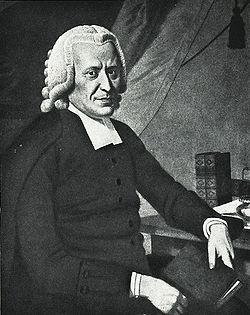
Johann Adolf Schlegel (17 September 1721 – 16 September 1793) was a German poet and clergyman.[1]
Biography
[edit]Schlegel was born in Meißen, Saxony, and was the brother of Johann Elias Schlegel.[1] After finishing his studies in Leipzig, he became a deacon and teacher at Pforta in 1751. In 1754, he became a pastor and professor in Zerbst, before moving to become a pastor in Hannover at the Marktkirche in 1759. He rose to the consistory of the Hanoverian Lutheran Church and the deanship at the Neustädter Kirche in 1775, dying in Hanover in 1793.
His sons August Wilhelm Schlegel and Friedrich Schlegel were influential early members of the Romantic movement.
He was a noted contributor to the Bremer Beiträge, a literary journal popular at the time. Despite his active work in literary circles, only one hymn has survived to the present day out of all his poetry and musical works. He also published a commentary on Charles Batteux's Les beaux-arts réduits à un même principe, translating it into German.
Schlegel died in Hanover, Brunswick-Lüneburg.
References
[edit]- ^ a b Paulin, Roger (2016-02-01). The Life of August Wilhelm Schlegel, Cosmopolitan of Art and Poetry. Open Book Publishers. pp. 16–23. ISBN 978-1-909254-95-4.
Well, that’s interesting to know that Psilotum nudum are known as whisk ferns. Psilotum nudum is the commoner species of the two. While the P. flaccidum is a rare species and is found in the tropical islands. Both the species are usually epiphytic in habit and grow upon tree ferns. These species may also be terrestrial and grow in humus or in the crevices of the rocks.
View the detailed Guide of Psilotum nudum: Detailed Study Of Psilotum Nudum (Whisk Fern), Classification, Anatomy, Reproduction